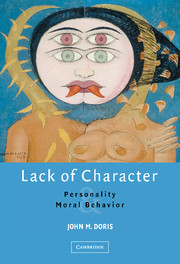Book contents
- Frontmatter
- Contents
- Preface: A Renaissance of Virtue
- Lack of Character
- 1 Joining the Hunt
- 2 Character and Consistency
- 3 Moral Character, Moral Behavior
- 4 The Fragmentation of Character
- 5 Judging Character
- 6 From Psychology to Ethics
- 7 Situation and Responsibility
- 8 Is There Anything to Be Ashamed Of?
- Notes
- References
- Acknowledgments
- Author Index
- Subject Index
8 - Is There Anything to Be Ashamed Of?
Published online by Cambridge University Press: 05 July 2014
- Frontmatter
- Contents
- Preface: A Renaissance of Virtue
- Lack of Character
- 1 Joining the Hunt
- 2 Character and Consistency
- 3 Moral Character, Moral Behavior
- 4 The Fragmentation of Character
- 5 Judging Character
- 6 From Psychology to Ethics
- 7 Situation and Responsibility
- 8 Is There Anything to Be Ashamed Of?
- Notes
- References
- Acknowledgments
- Author Index
- Subject Index
Summary
One truth the more ought not to make life impossible.…
Joseph ConradPerhaps I haven't yet gotten to the heart of things. I've been trying to show how ethical reflection can — and should — get on with less reliance on notions of character. But I've had relatively little to say about how this proposal relates to a central facet of ethical life. While I've gone on a bit about the “reactive attitudes,” I've been pretty quiet about the phenomenology of moral emotions — how the moral life feels, as it were, rather than how it is judged. But I need to say something, for if the moral emotions take some of their shape from the moral psychology of character, my skepticism about character threatens to reshape or, rather, misshape, emotional life. Here, as elsewhere, I think my revisionary ambitions promise more good than harm; if people could tutor their emotional tendencies as I suggest, our emotional economy would be a healthier one. This is a rather imperious declaration on a large topic, and I won't — can't — here do all the work required to validate it. Rather, I try to motivate my contention mainly through consideration of shame, an emotional syndrome that has been prominently associated with the ethics of character.
Guilt, Shame, and Self-Regulation
A central difficulty for ethical thought, at least since Plato's famous discussion in the Republic, is the problem of how to secure appropriate conduct when it is not possible to implement effective sanctions on misbehavior.
- Type
- Chapter
- Information
- Lack of CharacterPersonality and Moral Behavior, pp. 154 - 170Publisher: Cambridge University PressPrint publication year: 2002



